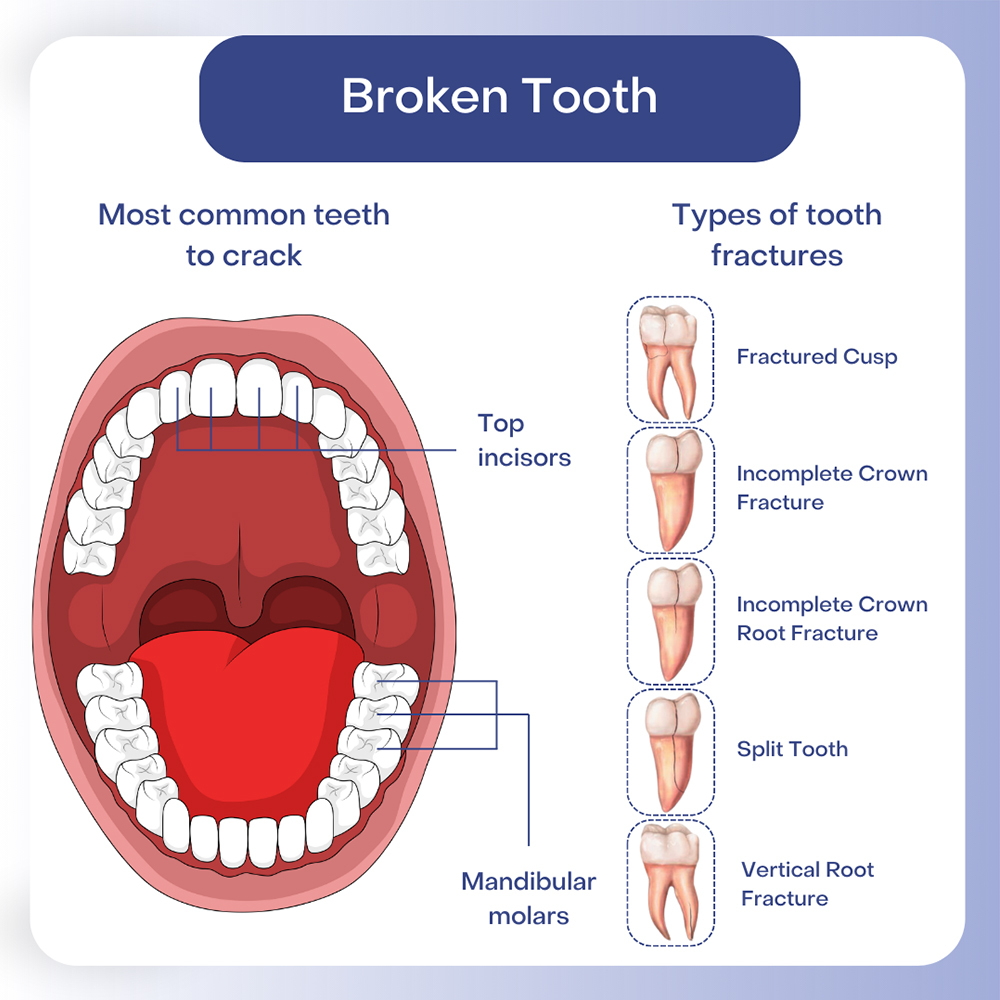Table of contents
In this article, you will understand how a tooth can crack, the symptoms it can cause, and possible treatments. You will also learn how to prevent some teeth from cracking and the long-term outlook for a cracked tooth.
A crack in a tooth can affect the crown, which is the part visible above your gum or the tooth root in your jawbone.
A tooth crown consists of three different layers. The outer layer is made from enamel and is a hard crystalline structure. Underneath the enamel lies the dentin, or the tooth’s middle layer. Dentin is much softer and made from many tubules tightly packed together. These tubules are hollow and surround the dental pulp. The pulp is the soft inner part of the tooth containing nerves and blood vessels.
A tooth root isn’t covered by enamel. Instead, it is covered by cementum, a relatively soft substance. Directly under the cementum is the dentin or middle part of the tooth. The root canals are in the tooth roots. These house the soft tissues extending from the dental pulp into the tooth roots.
When a tooth cracks, it can affect one or all these layers. The treatment we recommend will depend on the depth of the fracture and its severity. The sooner you receive treatment, the better the chances we can restore the tooth.

Common causes that can break a tooth include:
Any tooth can crack, but fractures usually affect the upper front teeth and your lower back teeth. Usually, a person will only fracture one tooth, but severe trauma can result in multiple fractured teeth.
Sometimes, it is obvious as you bite down only to feel a tooth crack ominously. A cracked tooth may cause no immediate symptoms. Otherwise, signs can include:
If you visit My New Jersey Dentist regularly for checkups, we will assess your teeth for any signs of cracks or fractures. However, if you think you have cracked a tooth, please make an appointment to come and see us as soon as possible. We can check the tooth in question and perform diagnostic tests, including an x-ray. Dental x-rays enable us to see if the fracture extends deep into the tooth and assess if the tooth can be saved.
The different types of tooth fractures are outlined below.
The treatment recommended will depend on the damage.
A small fracture or crack in a tooth can be mended with dental bonding. Composite resin is applied to fill the fracture and restore the tooth fully.
If a broken tooth has a small sharp edge, we may recontour your tooth enamel, polishing it so it feels smooth. This may be all the treatment recommended or can be combined with dental bonding.
When the damage is more severe, your broken tooth repair may mean covering the tooth entirely with a crown. Your natural tooth is hidden underneath the crown, which restores its strength, appearance, and structure.
You may need root canal therapy if a cracked tooth has become painful and infected. Treatment removes the innermost part of the tooth, the dental pulp, and all the tissues extending into the root canals in the tooth roots. Removing these tissues eliminates cracked tooth pain; afterward, the tooth is restored with a dental crown.
Veneers can be used if the damage to your chipped tooth is relatively minor and right in the front of your mouth. A veneer is a thin shell of porcelain custom-fitted over the tooth. It is often used as a cosmetic dental treatment, covering crooked front teeth so they look nicely aligned and more attractive.
Not every crack will need mending; for example, craze lines in tooth enamel will not require any further treatment. However, if you don’t like their appearance, you can always discuss with our cosmetic dentist in Hackensack, New Jersey how to improve this.
Not every broken tooth is preventable, but you can reduce your risk by practicing good oral care and paying attention to oral habits. Avoid chewing on very hard foods, pens, pencils, or nails, and don’t use your teeth as tools. If you grind your teeth, ask us for a custom-made night splint to protect them. If you like playing sports, we can provide a custom-made mouthguard to help prevent or reduce the risk of dental injuries.
A cracked tooth will not heal on its own, so seeing a dentist and getting it assessed professionally is important. When you can have a broken tooth repaired promptly, it reduces the risk of further damage and infection of the tooth.
The long-term prognosis for a repaired cracked tooth is good with the right care. However, some teeth will continue to crack and split even with treatment, which may result in tooth loss later.

My name is Victoria Kushensky. I am a general dentist dedicated to remaining at the forefront of my field. Combining compassionate care with extensive knowledge, I offer cosmetic and general dentistry services as well as advanced root canal treatments.
I earned my Doctor of Dental Surgery (DDS) degree from the esteemed New York University College of Dentistry. Throughout my career, I have honed my skills in various dental procedures, ensuring effective treatment for each patient’s unique needs. I prioritize patient comfort and understanding, taking the time to thoroughly explain procedures and address any questions.
More about Dr. KushenskyMy NJ Dentist: Victoria Kushensky, DDS
385 Prospect Ave Suite 304
Hackensack, NJ 07601
(201) 298-8000